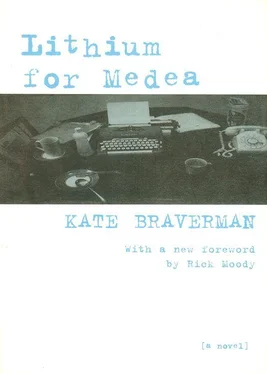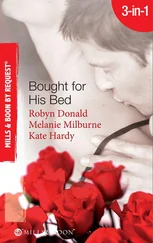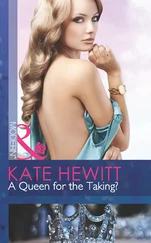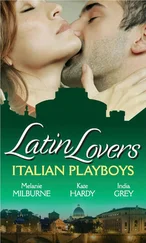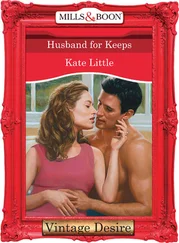And I was a train reeling through noon. It was a train from my childhood. There was a train station near our house in Philadelphia. My bedroom windows faced the train station. I had starched yellow curtains. At dusk I would watch men climb the low hill to their houses, newspapers rolled up under their arms. A parade of men returning to make everyone safe and warm.
Our house is gray stone and brick surrounded by a low wire fence. The Murphys live across the street. Their father is a drunk. Tommy wants to be a priest, he’s sixteen. Then there is Teresa, Paul, Billy who talks funny, talks like he ate worms. And Caroline, the youngest, my friend.
Caroline wears a white dress and veil and goes to a different school. I tell Mommy I want a white dress and veil. “No dice,” Mommy says. Caroline takes me with her to church. She baptizes my rag doll. We want to be nuns, black-gowned princesses promised to God with his glorious stained-glass eyes and chimes. I am going to name all my dolls after saints. Daddy sends me to bed without supper.
Then I am big in the soft snow, bundled up with a scarf and mittens in the center of the blizzard-sheeted street. The roofs are white, the whittled branches and buried cars. Even the train tracks below the hill are white. I won’t let Caroline Murphy hold my doll. She says I stuck nails in God’s hands. I tell her Billy talks funny because he eats worms. And Caroline says my father eats stones. She knows. She heard my mother tell her mother that my father had stones inside him, that he went away to get shot at by a big blue gun. His stones were growing like a bucket of big black worms.
It is dusk. We are watching the 5:57 train, impossibly black in the snow, nun black, briefcase-leather black, black as the felt around my father’s wide-brimmed winter hat.
I leave Caroline standing alone on the corner. It’s cold. The train is my signal, the time I must go home. And I’m running, the ground icy. Daddy has the first cancer then and can’t talk or swallow. And Caroline Murphy is six years old. She is about to step off that curb above the train station. She is about to step into the icy dusk street, the world whitish. The truck. And later the driver will say he felt a small bump. He thought he had a flat tire. That’s what made him stop.
My father is upstairs. He is lying under piles of covers. Everyone is screaming. Someone is pounding on the big wooden door, shouting, “Where’s your girl? Where’s your girl?” Mommy wraps me in her arms and rocks me, rocks me. And they are shouting, “There’s a run-over girl. Get a blanket. Get a blanket. She’s dead.”
Daddy comes downstairs. He looks as if he’s screaming but he can’t talk then, coughs blood, lies under blankets in bed all day. His toolbox is getting dusty. Mommy brings him lunch on a tray and he throws the food down and calls it garbage, garbage. Now he’s pulling me close to him, against his old wool bathrobe. He’s crying. I never saw Daddy cry before.
Then it’s kite season. And something terrible is happening. My bedroom windows faced the train station. I had yellow cotton curtains. Caroline Murphy was dead. Below, the backyard is numb gray. Mommy planned to plant it. Mommy wanted tulips. But something happened.
There were lilac trees on the street, maples, sycamores, elms. The houses were surrounded by low wire fences. And she was bringing Daddy lunch on a tray. I collect clay models and fossils. I study the transformation of a butterfly and think, how is it possible? That big man my father is turning back into a little boy.
“They’re lighting candles up and down the street for him,” my mother says into the telephone. “The superstitious bastards.”
Why is everybody lighting candles? Is it some kind of birthday? Where is my father? Why does she leave me alone all day? And I am dragged screaming to neighbors, the ones who light candles. And where is the birthday cake? The food they eat smells funny and I’m yelling, no, no, I don’t want any. I want Mommy and Daddy. They take a box out of the closet. It opens into a little bed. I am given a blanket that scratches. People are sleeping near me, I can hear them breathing. I stare into the night, terrified.
I know I am safe. But when I close my eyes I suddenly think of being beaten, eaten. And terrible things are crawling across the black circle inside my head. Should I tell Mommy? But Daddy has gone to the hospital. Preparing for the inevitable, she cancels my piano lessons. I stamp my small feet and grow pale, the blood drains and what does it mean? What does it mean?
“Just sit nice and quiet,” Mommy says. “Look out the window. Let Daddy try to sleep.”
We are riding on a train. It cuts a path to the Pacific. I witness the breathless rage of sunset when the bridges were consumed, the maps and borders. And the train runs in a tight circle powered by atomic fuels, radium and cobalt. Blue jewels, radioactive beams like a stream of blue asters, clusters of blue agapanthus.
And the train is an express. No one is driving. It just keeps going. It is powered by atomic fuels. It can grind its clipped metal wings forever while I ride in my window seat, crisscrossing the childhood I carry with me like stage props in a trunk.
Maple leaves. My sled. My kite. The cool sense of birth before the first snow and Mommy standing me at a window, saying, see it now before the tire scars, see it spread over there, falling in the streetlamp glow, a golden halo, and you are my daughter, my angel. Flowers pulled from the yard of a priest who chased me halfway home in an August of fireflies dying in jam jars. The run-over girl, the stain in the street and my six-year-old heart already shut. I never cried, even though she crossed that dusk street to play with me. There is a train rumbling down thin metal grooves like fine rows of black stitches weaving through the edges of the wound, the contagion of my girlhood. The train is running in a tight circle powered by atomic fuels, radium, cobalt. Blue jewels and pansies pressed between the pages of a book. The train is running in a circle over and over past the hosed-down stain of Caroline Murphy, the red patch in the street, my heart already shut, the strange neighbors, the blankets that scratched, my father spending entire days in bed under woolen blankets in an August of fireflies dying in jam jars.
SAW DR.
“What did he say?” I needed a cigarette. I needed a shot. I was too cold, too hot, half asleep and jammed wide awake. My age was unsolid. The geography unsolid. The world was swaying, decaying.
TOM. TRY 2 EAT.
“They’re going to put you on solid foods? The graft must be working, right? He looked under the bandages?”
PINK. NEW SKIN.
“I knew you would make it. Ever since you got up and shadowboxed death.” My father looked at me oddly. “Do you remember?”
My father shook his head as if trying to clear it. He shrugged his shoulders, noncommittal.
R THEY SENDING ME HOME 2 DIE? I THINK OPER. WAS
FLOP.
“You mean you think the doctors are lying?”
My father nodded his head. Nothing spurted in a red stream from the crevice in his neck. The sunlight was streaming thickly, silkily into the room.
“Do you think you’re really dying and they’re just jerking you off? Getting the room ready for another stiff? Pretending and hoping for a miracle?”
BINGO.
I wanted a shot. I wanted to feel strong, warm, capable. The day was a set of train tracks. With one shot I could be atomic fueled. I could steam through gullies. I could tunnel dry clutter from Philadelphia to Los Angeles, from Berkeley to Venice, the tight circles of my life, the black tracks like rows of tight new stitches.
My father was staring at me.
“You always said life was a grab bag, a race for cripples, a six-thousand-dollar claimer. But one of them has to cross the finish line. And you know what separates a hero from a bum? An inch. A nose under the wire.”
Читать дальше
